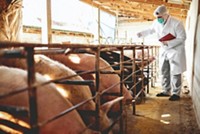Advertisement
Grab your lab coat. Let's get started
Welcome!
Welcome!
Create an account below to get 6 C&EN articles per month, receive newsletters and more - all free.
It seems this is your first time logging in online. Please enter the following information to continue.
As an ACS member you automatically get access to this site. All we need is few more details to create your reading experience.
Not you? Sign in with a different account.
Not you? Sign in with a different account.
ERROR 1
ERROR 1
ERROR 2
ERROR 2
ERROR 2
ERROR 2
ERROR 2
Password and Confirm password must match.
If you have an ACS member number, please enter it here so we can link this account to your membership. (optional)
ERROR 2
ACS values your privacy. By submitting your information, you are gaining access to C&EN and subscribing to our weekly newsletter. We use the information you provide to make your reading experience better, and we will never sell your data to third party members.
Biological Chemistry
Fake, Inferior Medicines Pose Worldwide Risks
Health: Report finds that ‘pandemic of falsified and substandard medicines is pervasive and underestimated’
by Andrea Widener
April 27, 2015
| A version of this story appeared in
Volume 93, Issue 17
Poor-quality medicines pose a global threat to human health that could undermine decades of progress against major diseases, including HIV/AIDS, malaria, and tuberculosis, new studies show.
Up to 41% of 17,000 samples of drugs failed to meet international quality standards, according to a special report published last week (Am. J. Trop. Med. Hyg. 2015,
The report included 17 research papers that detail the problem and identify potential solutions for medicines that are faked, substandard at the time of manufacturing, or degraded because of poor storage conditions.
Although there is a long history of faked drugs in the developing world, the problem appears to be spreading. “The pandemic of falsified and substandard medicines is pervasive and underestimated, particularly in low- and middle-income countries where drug regulatory systems are weak or nonexistent,” explains special report coauthor James Herrington of the University of North Carolina.
Among the fake drugs identified in the studies were malaria medications, which caused the deaths of an estimated 122,350 African children in 2013 alone, and antibiotics, which increased the risk of antibiotic resistance.
The report highlights the importance of better drug detection technologies, especially for the developing world. In an accompanying editorial, former FDA commissioner Margaret A. Hamburg says a better international regulatory structure is essential to fulfill “the need for global quality and safety oversight to prevent patient exposure to falsified products.”



Join the conversation
Contact the reporter
Submit a Letter to the Editor for publication
Engage with us on Twitter